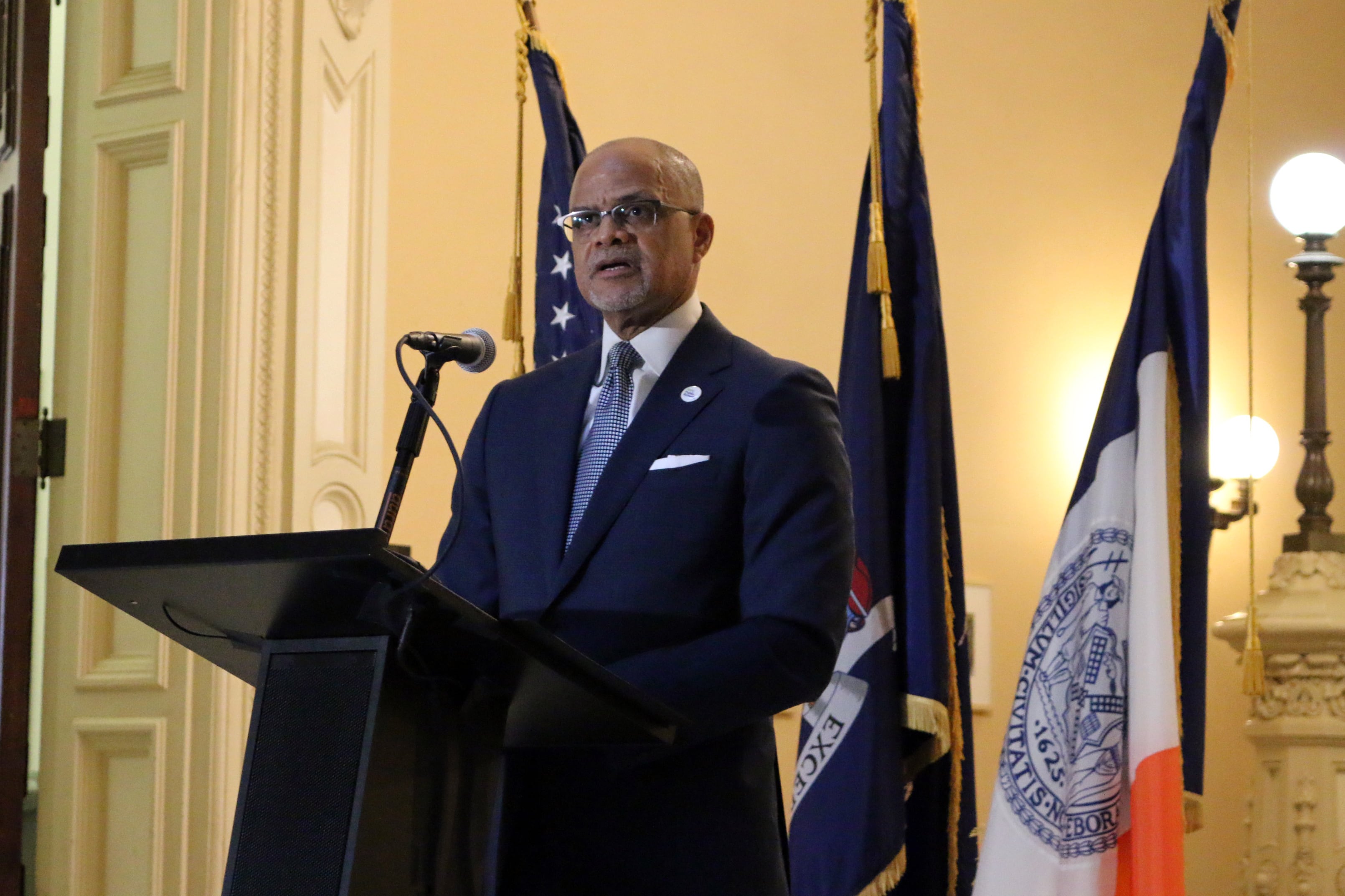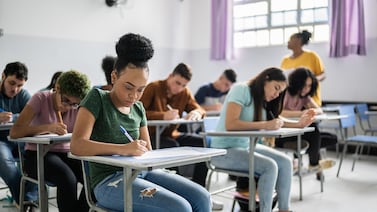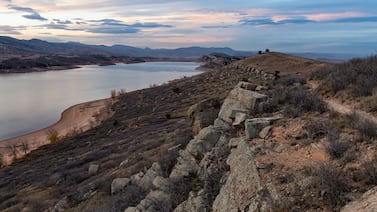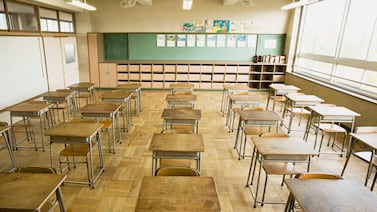Sign up for Chalkbeat New York’s free daily newsletter to keep up with NYC’s public schools.
To help address tensions over the Israel-Hamas war, the city is rolling out new training for educators, expanding curriculum resources, and signaling to principals that they will have more leeway to crack down on bullying and other bigoted behavior.
Beginning this spring, all middle and high school principals will receive training “focused on navigating difficult conversations,” schools Chancellor David Banks said, and those leaders will be responsible for sharing what they learn with their staff. The city is also updating its diversity training to delve more deeply into antisemitism and Islamophobia.
“The way through this moment is not to malign our students or impose our own ideologies on them, or to bury our heads in the sand,” Banks said during an address to school staff, parents, and faith leaders at the department’s Lower Manhattan headquarters. “We must educate our students, and sometimes our staff, to raise their consciousness and to overcome bias.”
The announcement comes after some communities across the city, including university campuses, have fractured over the devastating violence thousands of miles away. In October, Hamas militants killed 1,200 people and took over 240 hostages, with about 130 remaining captive, according to reports. Israel, in response, has bombarded Gaza, fueling a humanitarian crisis and killing over 25,000 Palestininans, including many children, according to health authorities there.
Since the start of the war, city officials have provided guidance to schools about how to have productive discussions about the conflict. Some educators have made efforts to facilitate discussions, including how to identify misinformation on social media. Others have largely steered clear of the issue. In advance of pro-Palestinian protests in November, Banks issued a warning that educators should keep their personal views to themselves, a directive that made some wary of broaching the topic.
On Monday, Banks reiterated that educators should play a role in helping students make sense of what’s happening, while taking care to not express their own opinions.
“We need to point students to reliable and objective sources about the current crisis,” he said. “We cannot leave it to social media to educate our children.”
Some schools have taken matters into own hands
Some students have created their own spaces in the absence of explicit efforts by their schools to address the topic. One campus brought Muslim and Jewish campus groups together to have educator-supervised discussions.
On other campuses, the war has been impossible to avoid. In late November, hundreds of students at Hillcrest High School in Queens flooded the hallways in protest of a photo of a teacher holding an “I stand with Israel” sign from a rally just after the Oct. 7 attacks, which had circulated on social media. Videos of the incident show students dancing in the hallways past a water fountain that had been pulled from a wall. The health teacher in the photo, who is Jewish, took cover in a room on a different floor.
The situation drew significant media attention and condemnation from Mayor Eric Adams and Banks, though the chancellor emphasized that the incident was a “teachable moment.” The Education Department removed the school’s principal. Officials said an assistant principal had been appointed principal and was recommended by current and former educators at the school, including the teacher who was the subject of the protests.
On Monday, Banks promised updated training on school safety for principals in the coming weeks, noting that some have felt “disempowered” from taking disciplinary action even for “egregious” misbehavior — a position echoed by the principal’s union. Although officials indicated the city did not intend to revise the city’s discipline code, which spells out the conduct for which students can be suspended, Banks wants principals to be empowered to enforce it.
“We can not and we will not have schools where students feel like they can do whatever they want without accountability for their actions,” he said.
That move raises questions about whether the new directive could lead to a surge in suspensions, which returned to pre-pandemic levels last school year, and which are disproportionately issued to Black students and those with disabilities.
Nelson Mar, a senior staff attorney at Bronx Legal Services, said he hopes the city takes reports of bullying more seriously, as he said schools often ignore student reports of it. But he worries schools will resort to removing students from classrooms instead of trying to address the “root cause.”
“When staff look to the discipline code they often see suspension and removal as the ONLY response to these behaviors,” Mar wrote in an email.
Educators feel divided over new directive
School leaders offered mixed reactions to Banks’ plan. City officials have not yet named which outside organizations will help lead that training or its cost.
“I am happy to hear about the efforts to step up and do something … but I am hesitant to expect too much,” said one Brooklyn principal who spoke on condition of anonymity because of the sensitive topic.
“It’s so hard for the [Education Department] to do anything at its scale,” the leader added. “We’re talking about issues that can really be best solved at the people level.”
One Bronx assistant principal said her school has struggled with tensions around the Israel-Hamas war, including “free Palestine” posters students painted and put up in the hallways that made some Jewish teachers feel uncomfortable.
“There are so many intense feelings around people’s religion and identity — I’d be curious what those kinds of conversations are going to look like,” the assistant principal said. “There was definitely a lack of guidance from the [Education Department], so I guess I’m glad they’re trying.”
Though few incidents have been as explosive as the situation at Hillcrest, a steady stream of controversies have burst into public view, some fueled by conservative media outlets. In one recent example, an art class at a Brooklyn elementary school focused on Arab culture made headlines for its map of North Africa and the Middle East that did not label Israel. The 12-year-old poster at P.S. 261 was removed after the stir, a move lamented by many parents from the school, which serves a diverse population including Muslims and Jews.
And some parent councils have waded into the issue, inviting another set of heated disagreements. Some of the rhetoric in parent council meetings has devolved into personal attacks that have made it challenging for these volunteers to work together. The Education Department said it plans to launch a series of anti-discrimination workshops for parent leaders beginning in February.
Banks also announced an interfaith advisory council to help guide the city’s response.
“This faith advisory council is not a grievance committee,” said Rev. Jacques Andre DeGraff, chair of the council. “If you’ve got a gripe or a beef, go up the street to the United Nations. Here, we are lighting the candle in darkness.”
Michael Elsen-Rooney contributed to this story.
Alex Zimmerman is a reporter for Chalkbeat New York, covering NYC public schools. Contact Alex at azimmerman@chalkbeat.org.







